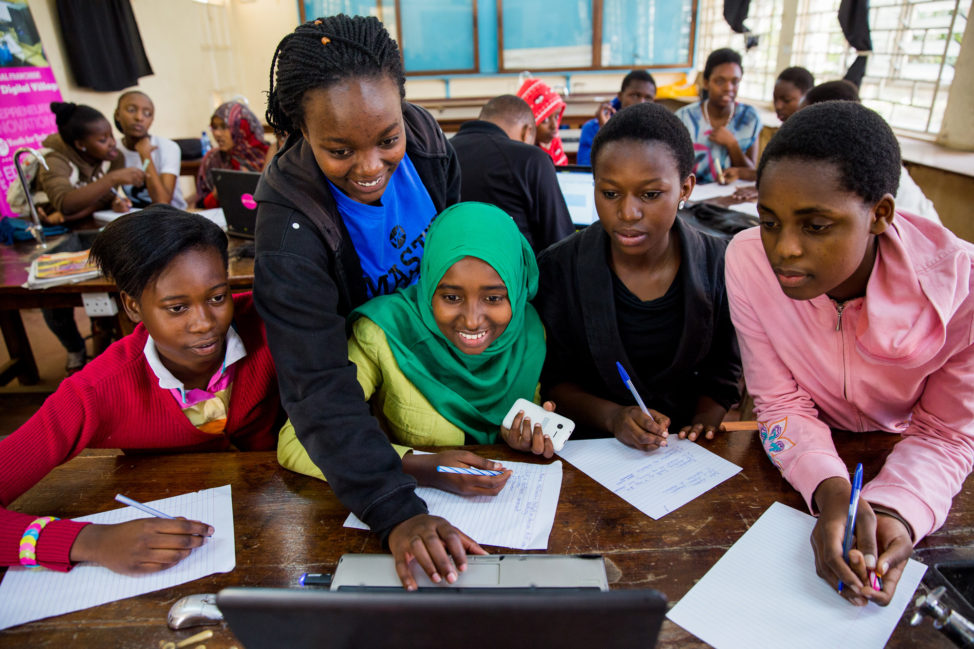
Nigerian students learn about 3-D printing in a class offered by the Youth for Technology Foundation. (Youth for Technology Foundation)
An international nonprofit will start training 6,000 Nigerian girls in digital skills in early 2017. The initiative is part of an ongoing effort to use technology to empower underprivileged youth and women in the developing world.
The Youth for Technology Foundation (YTF) has been transforming the lives of young people and women in developing countries for the past 16 years. The group works in Nigeria, Kenya, Uganda and, more recently, in Colombia, Latin America.
“Our mission is really to create a rich learning community where the appropriate use of technology affords opportunities for youth and women living in developing economies,” said YTF President and CEO Njideka Harry in an interview.
The latest digital training initiative targets out-of-school Nigerian girls who have survived human trafficking or are at risk of falling prey to traffickers.
Aided by professional mentors and partnerships with local businesses, YTF’s Nigeria hubs will teach literacy, numeracy, business and financial inclusion, in addition to 3-D printing and other skills. When training is done, the girls will receive certification that will help them find apprenticeships or jobs, or start their own businesses.
YTF typically targets people between the ages of 8 to 25. These young people have “long productivity cycles,” said Harry, and are the “co-creators of powerful information and communication technologies.”
“Youth,” she said, “are at the center of the development, specifically in Africa, where there is this issue of the youth bulge. … If those young people are not nurtured, if they are not given the right opportunities, you know, “it could be a disaster, in essence, as a cultural dividend.”
With the explosive growth of mobile technology in parts of the world like Africa, Harry said it is important that young people learn not just to become consumers, but also to create mobile apps that would be useful to their communities.
But it takes a village to raise a child, as the Nigerian proverb goes. And so YTF also invests in helping the mothers of its young students – women who form the economic backbone of their communities and often give back “as much as 90 percent of their household income.”

Students participate in a class at the Youth for Technology Foundation academy in Nairobi, Kenya. (Youth for Technology Foundation)
“When we started out working in 2000,” Harry added, “we were working in communities with large groups of young people. And the young people a few years into this work told us ‘our mothers can actually use this training. Our mothers are the entrepreneurs in the community, they are the backbone. It is as a result of their efforts that our school fees are paid and our health is taken care of and the wellness of our communities continues to grow.'”
Women spend about 70 percent of discretionary consumer spending in the global economy, so “they are a huge piece of the global economy itself,” she said. “Investing in women is not just an afterthought, it’s really an economic imperative.”
So YTF partnered with civil society organizations, governments and the private sector to create programs to help women learn more about managing their affairs, using applicable technologies such as internet access, mobile phones and mobile banking.
And more recently, YTF added 3-D printing to its Africa curriculum. Harry believes the technology is specifically applicable to Africa and “has the opportunity to inspire science, technology, engineering and math in the education sector,” particularly for girls.
I have been printing jewelry like rings and bracelets and selling them to my classmates. The world needs more female innovators to tackle the toughest challenges we have today” – Treasure, 15-year-old secondary school student in Nigeria
“It also has the opportunity to [foster] an entrepreneurship mindset in the minds of young people,” she said. “And so we introduce 3-D printing technology to teach them how to create, invent, and design the world that they envision.”
Sixteen years later, the organization has trained 1.6 million women and youths and helped start and expand 12,000 businesses.
Add to that another 6,000 eager Nigerian girls.
